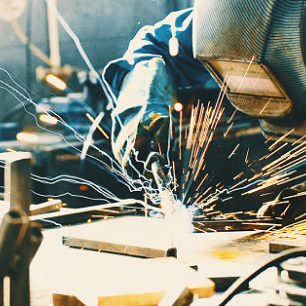Welding Digest
Jump to:
Why Inspectors Should Understand Both Welding and Coating—and What It Means in the Field
Weld quality and coating performance are tightly connected. The true test of a weld and the coatings that contribute to its durability lies not in what’s visible but in what’s hidden beneath the surface. A flawed weld can compromise structural integrity long before coatings come into play. And a great coating can’t hide a bad prep job. It can be the prettiest weld in the world, but if there’s porosity hiding inside or if the coating doesn’t stick, it’s not going to hold up.
Specialization vs. Situational Awareness
Welding and coating inspection is about anticipating issues before they turn into failures. Most inspectors start their careers by specializing—either in welding or coating. And that makes sense. Both disciplines are deep, technical, and demand focused training. But in the field? Projects don’t come divided that neatly.
When problems are identified early, timelines hold, budgets stay intact, and what gets built does its job. And while the work is technical, it’s also personal—because when something fails, it’s not just about busted budgets. And it’s not just the welder or the coatings technician who’s answering questions—it’s the inspector, too. It’s about safety. Reputation. It’s someone’s job—and in some cases, someone’s life—on the line.
The Payoff to Expanding Your Inspection Skillset
That's why inspectors who understand both welding and coating—who can see the whole picture and act on it—are increasingly in demand. They catch more problems early. They collaborate better across teams. They understand how upstream decisions affect downstream performance. And most importantly, they help prevent costly mistakes that a siloed view might miss.
Getting educated in both welding and coating inspection isn’t about becoming a jack-of-all-trades. It’s about having enough cross-disciplinary fluency to do your job better—and to be the kind of inspector others want on site when the pressure’s on.
What Experience Teaches That Textbooks Can’t
Because let’s be honest: the real world rarely plays out like a textbook. Welds get rushed. Environmental conditions shift. Documentation isn’t always perfect. Field experience—the kind of insight that comes from time, training, and a whole lot of “seen it before”—is what helps flag an issue before it becomes a big one.
Whether you're working offshore, in a shipyard, or on a pipeline, bridge or building, inspection isn't just a step in the process. It's what stands between a job well done and a do-over no one can afford. And the more you understand the big picture—from the root pass to the final topcoat—the more value you bring to every project.
Want to Go Further?
So, whether you're adding NDT methods to your coating toolkit or learning more about surface prep as a welding inspector, expanding your inspection perspective isn’t just a smart career move. It’s how good inspectors become great ones.
Want to dig deeper into both disciplines? AWS is offering a new series of online training sessions focused on welding and coating inspection, taught by an instructor who's been there, seen that, and can help you avoid the same mistakes.


